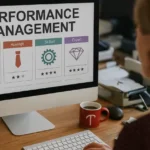The shift to remote work has brought convenience and flexibility to employees, while also bringing with it, a slew of challenges. One of these issues is ‘brain rot’, which is a state of mental stagnation caused by isolation and a lack of meaningful engagement.
Declared as Oxford’s Word of the Year 2024, ‘brain rot’ has captured global attention as a growing concern in various contexts, including the workplace. As companies adapt to the new way of remote working, HR teams have a critical role in addressing these challenges and ensuring employees remain motivated and productive.
Causes of Brain Rot in Remote Work
In some cases, remote work can lead to a range of problems that contribute to brain rot. A few of the reasons for this phenomenon are:
1. Lack of Social Interaction
The absence of in-person interactions can make employees feel isolated and disconnected from their teams. It can lead to a fragmented work culture, which is undesirable for HR teams.
2. Repetitive Tasks
Without opportunities for growth or creativity, employees may experience boredom and mental fatigue. Similarly, working on the same tasks repeatedly with limited social interactions will also lead to monotony.
3. Blurred Work-Life Boundaries
Working from home often leads to overworking, burnout, and reduced mental clarity. Managers or supervisors could enquire at odd times, resulting in a lack of work-life balance.
4. Digital Overload
Similarly, increased reliance on virtual tools can result in a lack of meaningful human connection, further increasing feelings of stagnation. Digital overload can also be damaging to the physical health of the employees.
HR’s Role in Combating Brain Rot
HR professionals are uniquely positioned to tackle the issues we discussed above, as they can create a thriving remote work environment. Following are some strategies they can implement for their remote workforce:
➔ Virtual Engagement Activities
HRs can organize virtual team-building activities, casual catchups, and interactive activities to develop a sense of community among their employees.
➔ Continuous Learning Opportunities
By providing access to online training platforms and encouraging upskilling, HRs can ensure that their employees stay intellectually engaged. It helps avoid brain rot as they are learning something new.
➔ Encouraging Collaboration
HRs can also promote cross-departmental projects and use collaborative tools to stimulate teamwork and creativity. It helps in increasing social interactions, further developing a sense of belonging.
➔ Promoting Work-Life Balance
HRs can also advocate for flexible working hours, regular breaks, and clear boundaries to help their employees recharge and avoid burnout. By promoting work-life balance, HRs can also showcase their commitment towards employee engagement.
Innovative HR Initiatives for Remote Teams
To combat brain rot effectively, HR department should think outside the box. Some of the initiatives they can take to avoid brain rot are:
1. Gamified Learning Sessions
HR teams can start by transforming their training sessions into interactive, gamified experiences. It makes learning fun and engaging for their staff, while also ensuring knowledge retention.
2. Virtual Wellness Programs
They can also organize activities like yoga, meditation, and mental health workshops to help employees manage stress. Since these activities can be undertaken remotely, they promote physical and mental wellness in a remote work setting.
3. Employee-Driven Initiatives
HRs can also encourage employees to start virtual clubs or interest groups, which helps create meaningful connections beyond work tasks.
4. Regular Feedback Mechanisms
They can also conduct pulse surveys to gather employee insights and address concerns proactively. It will help them identify their employees’ concerns and resolve issues as soon as they arise.
Conclusion
Brain rot is a real challenge in the remote work era, but HR professionals have the tools and strategies to combat it. By developing engagement, promoting collaboration, and supporting employee well-being, HR teams can transform remote work into an environment of growth and innovation. Organizations must invest in these HR-led initiatives to ensure their teams remain mentally stimulated, productive, and connected.









